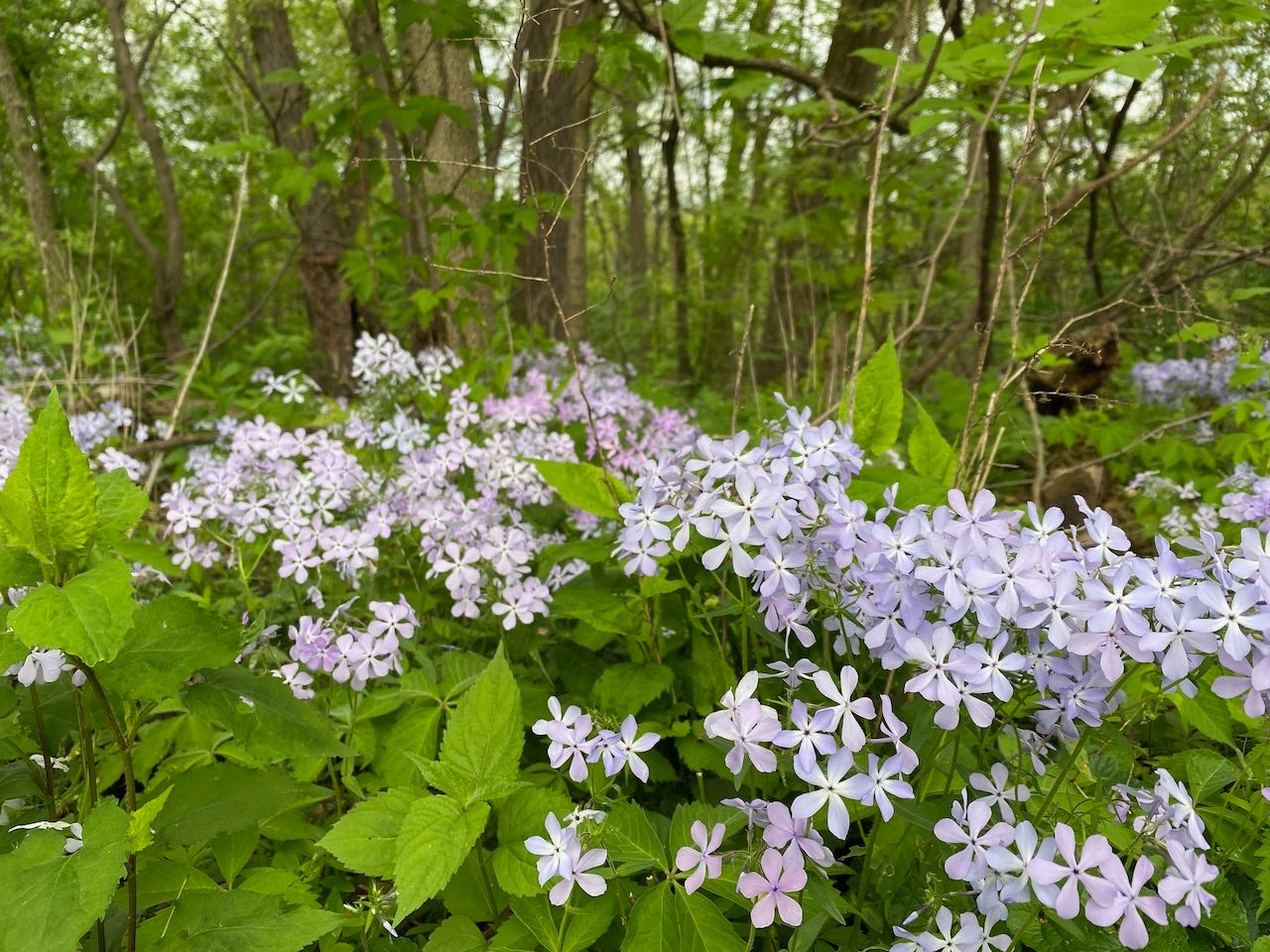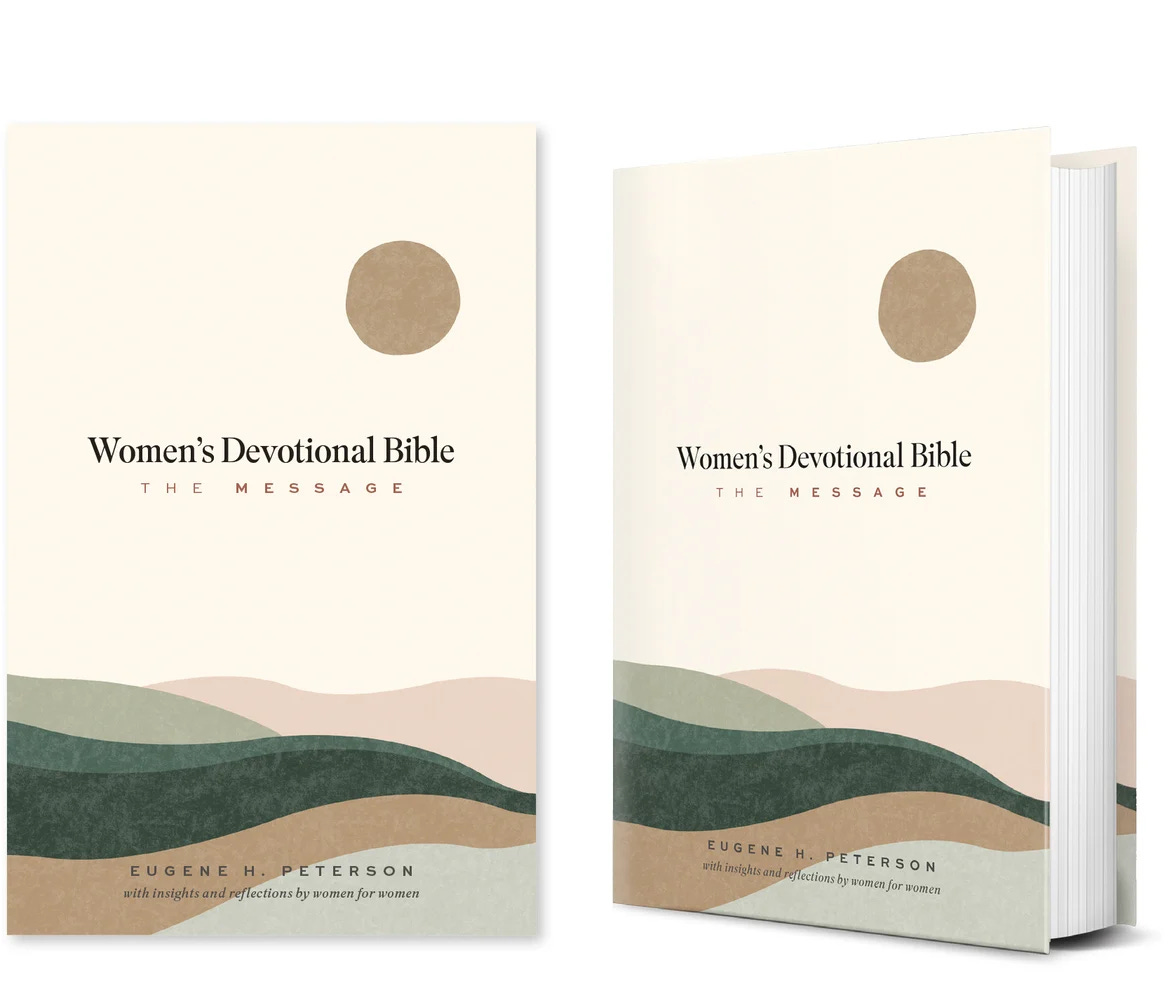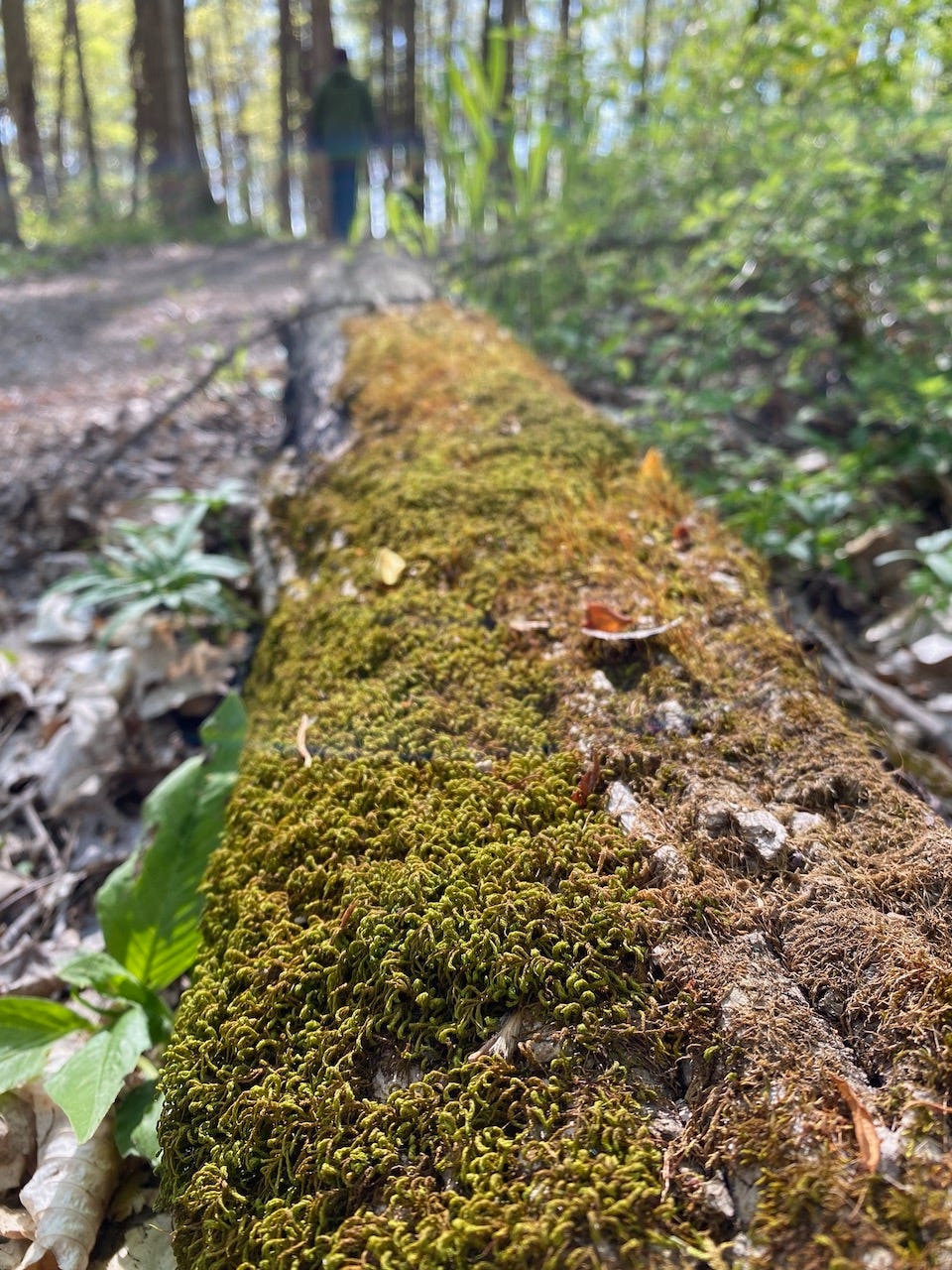The Wonder Report: June 2, 2025
The Opportunity of Time
Happy Monday!
We are in the final days of Eastertide, and our Easter decorations are still doing their good work of reminding of us of this season of resurrection and hope. And now, anticipation has heightened in our readings, our prayers, and our imaginations during this short 10-day period between Ascension Day and Pentecost as we “are waiting, praying and letting our desire intensify,” as Bobby Gross describes it. “We are waiting for the Spirit. We need his revelation of truth, his protection against spiritual darkness and how power for witness and service.”
On Sunday, when the Bishop was visiting our small congregation to confirm several new members, he reminded us that “God’s intention is that we would live in the power of the Spirit our whole lives.” While I’m not always sure what that means, I expect that we need look no further than our own acts of love, courage, and goodness—and those of our brothers and sisters—to see glimpses of that power. He’s at work even now!
In the installment of The Wonder Report, I want to focus a little more on what it means to do good … especially as it relates to the theme of time that we’ve been circling around for months.
Let’s wade in!
Ain't Much to Waste
Recently, I was reading one of Kate DiCamillo’s newest books, a fairy tale called The Puppets of Spelhorst*, as a possible pick for my elementary-age book club at the library. As the title implies, The Puppets of Spelhorst is a story about puppets. But as any book written by Kate DiCamillo implies, it’s about so much more, too. It’s about dreams and hopes and friendship. It’s about wonder, risk-taking, and love. And interestingly, as I found myself absorbed by the world of the girl, the boy, the king, the wolf, and the owl, I discovered it’s also a story about time and the opportunities it provides.
“Well. Nonsense coming and nonsense going,” Jane said. “Ain’t it just?”
There was a long silence in the blue room.
“I was thinking, though, about the time in between,” said Jane. “And how there ain’t that much of it to waste.”
And with those words, the character Jane, a real person in the story not a puppet, makes a choice—a big choice in her otherwise small life—and soon after the book ends with readers breathless about what that choice might mean for all the other characters in the story, especially for the puppets. And maybe even for the reader herself.
Because Jane is right: Time is precious. And the opportunities feel endless.
::
I’ve written so intermittently here over the past few months that you would be forgiven for not realizing there’s actually been a theme I’m exploring. It’s a theme I’ve thought a lot about over the past several years, and more intensely the past few months. That theme is time and how it shapes me and how I wrestle against it and what a gift it is. I’ve written about time-keeping as a spiritual practice, about the inevitability of time, and most recently about the limits of time. But today, in what I think is the last of this series, I want to explore the opportunities of time, or maybe better, time’s possibilities.
While the 24 hours we have each day, and the 365 days we have each year, and the 70 to 80 years we have in a lifetime can certainly feel like a constraint—especially as we use up the bulk of our days and the number left grows smaller than the number behind us—imagine all that can happen with the time! Think of all the ways we can spend and invest and use it for good … or squander or misuse or waste it, as Jane fears.
Say what you will about modern life, it’s certainly full of options. Just in my one small and inconsequential life, I’ve gotten married, helped raise three boys, cared for an aging parent, held dozens of jobs, taken hundreds of trips, written or contributed to half a dozen books, lived in numerous apartments and houses across many different cities and states. I’ve attended four colleges in addition to the two from which I actually earned degrees. And those are just the bigger things on the list.
But life isn’t just the sum of our big decisions. It’s about all the little decisions we make from one minute to the next too … decisions that hardly even feel like decisions because we have to do them one way or another. It’s all the hours I’ve spent cooking and eating by myself, with family, or with guests. It’s the hours I’ve spent walking and running for health, for pleasure, for transportation. It’s the hours spent writing at my desk alone, and the hours spent reading, which are more numerous still. It’s even the 30 minutes each morning and the 10 minutes each night I spend showering, brushing, washing, and changing.
When I look back on all these big and little choices, I stand behind most of them, recognizing them as the life I’ve built, one decision at a time. But there’s some regret hidden among them, too, as I remember … achingly … all the hours spent scrolling through my phone or watching shows I don’t really even like or worrying about possibilities and outcomes that never happen.
The regret of time wasted seems like it’s about time’s limitations, about how few minutes, days, and years we actually have and how precious that makes them. That’s what DiCamillo’s Jane seems to be saying too, “how there ain’t that much of it to waste.” But the more I consider the idea of wasting time, it’s got to be about more than just throwing away a few minutes here and there that I can never get back. And while it might also seem like wasting time is about wasting opportunity, I think there’s more to it than that, too. It’s about more than just trading a few minutes of television watching for a few minutes of exercise or doing the dishes. Though that might be a good trade for most people most days.
As I see it now, the real problem with wasting time is that it’s one of the few tools we have to counter evil in this world. And being careful to spend our time the way God wants us to—by doing all the things that reveal his goodness to the world around us—is one of the wisest things we can do. It’s why Paul cautions us in Ephesians 5:15-17 to “be careful how you walk, not as unwise people but as wise, making the most of your time, because the days are evil. So then do not be foolish, but understand what the will of the Lord is.”
::
What is the will of the Lord, though? And how can we understand it?
While God’s will is surely to be sought in a career path, a potential spouse, the decision to become a parent, or a For Sale sign in the yard, there’s so much more to it than that. By appealing to “how we walk,” Paul seems to be saying that how we spend all our time (little “t”) is in the realm of God’s will for us that we must take care over and exercise wisdom. In every area of our lives where we have control—from the cross-cultural calling to the cross-bearing sacrifice of caregiving—these are the places where the good we do can triumph over the evil of the age. And once again, we find ourselves back to Annie Dillard’s insight that “how we spend our days is, of course, how we spend our lives.” And God cares about it all.
But to be clear, I do not think God is calling us simply to a better accounting of our time for the sake of efficiency or profitability. He’s not calling us to “work smarter not harder.” He’s not calling us to increase our influence or only do the things that will bring us greater likes or shares. In as much as these are the guiding principles of our age, these might even be part of the evil days Paul warns against. It’s too easy to float along with the current, even if it’s taking us in the wrong direction. Rather, by contrasting “making the most of our time” with the evil of “today” (whatever age that might mean for Paul’s readers), God is calling us in every epoch and in every season to think carefully about our time so we can use it for what is good.
Which of course begs the question: What is good? And what is good in my life now? How do the decisions of a day reflect that goodness that God is calling us to? What if the decisions we spend the most time on—decisions about the big stuff—are actually less important than discerning what is good and how we move toward it with our time?
In Psalm 37, David reflects deeply about goodness, especially since a look around made him think that evil was the real winner of the day. When David says (probably to himself as much as anyone), “Do not fret because of evildoers, be not envious toward wrongdoers,” I feel like he’s talking to me, too, right here in central Indiana in the year 2025. Because sometimes it feels like evil is the winner of the day from where I’m sitting, too.
It’s not enough just to stop our fretting and envy, though. David also paints a picture of what goodness truly looks like in a life with these rich, active verbs:
trust in the Lord
do good
dwell in the land
cultivate faithfulness
delight yourself in the Lord
commit your way to the Lord
rest in the Lord
wait patiently for Him
Of course it takes wisdom to figure out the specifics of doing good in each of our lives, and wisdom to recognize the evil in our days, too. It’s why Paul tells us to “walk, not as unwise people but as wise.” As we do, however, making the most of our time becomes a blessing rather than a burden. It’s constraints serve as conduits; our wrestling with time helps refine us. And perhaps most importantly, we discover that nothing is ever wasted, especially our time, when “the steps of a man are established by the Lord, And He delights in his way. When he falls, he will not be hurled headlong, because the Lord is the One who holds his hand.” (Psalm 37:23-24).
::
A train entered the staion with a great rumble.
Jane Twiddum smiled.
She stood. She looked down at the trunk.
“Well, then,” she said, “the moon and the stars and the sun and the great wide world are waiting for us, dearies. We should be off.”
I wonder … how do you decide how to spend your time? Do you ever feel time has been wasted? What is the evil that you are resisting in your life right now? What good do you feel God is calling you too?
The Serviceberry: Abundance and Reciprocity in the Natural World
Robin Wall Kimmerer’s latest book, The Serviceberry*, is a wonderful reflection on the ethic of reciprocity and the idea of a gift economy. Wall Kimmerer uses the serviceberry, a tree known by many other names around the US, including shadbush, shadwood, juneberry, saskatoon, sugarplum, wild-plum, and chuckley pear, to talk about all the ways that sharing, giving, and receiving connect us to one another and help build communities in ways that financial transactions never can. The book refutes the scarcity mindset, the notion that we all have to fight for the little bit that’s ours, and builds on the idea of shared abundance, that there will always be enough when we take only what we need and share what we have with others. It’s an idea with echoes in Paul’s writing in 2 Corinthians 8:14: “at this present time your abundance will serve as assistance for their need, so that their abundance also may serve as assistance for your need, so that there may be equality.” If you’ve read and enjoyed Lewis Hyde’s The Gift: How the Creative Spirit Transforms the World*, you’ll find a lot to enjoy in this book, too.
Women’s Devotional Bible: The Message
Several years ago, I was invited to participate in a large-scale writing project to create a women’s devotional Bible based on Eugene Peterson’s The Message. This project was a joy to work on, and after years of review and editing, it’s finally coming to fruition! The Women’s Devotional Bible: The Message* will officially be released by NavPress on August 5, and you can preorder a copy now. A shorter version of just the Gospels and their accompanying devotions also is available now*. An index in the back helps you locate which authors wrote which devotions. I’m excited to celebrate this project along with dozens of Christian women authors from around the world who contributed!
Well, you’ve come to the end of another Wonder Report. Thanks again for joining me. It’s a privilege to share this space with you and to enter into these conversations together.
As always, if you’d like to send me a note or ask a question, you can hit reply and end up in my inbox. You can also leave a comment over on the Substack app. I can’t always respond quickly, but I try to always respond.
Until next time,
Charity
*These are affiliate links, and if you purchase books using these links, I will get a small commission from Bookshop.org, a platform that gives independent bookstores tools to compete online and financial support to help them maintain their presence in local communities.







“But life isn’t just the sum of our big decisions. It’s about all the little decisions we make from one minute to the next too…” this statement made me think of that Annie Dillard quote and as I read on you read my mind! So many good thoughts on time here, Charity. I’ve moved into a different place than I used to be regarding how I “spend” my time. It’s not really a currency, is it? I try to savor instead of looking for a fruitful outcome to the moments. It makes me feel closer to God, even if I’m just “being.” Thanks for such a thoughtful post, friend.
How exciting about the writing opportunity in the new Message Bible!